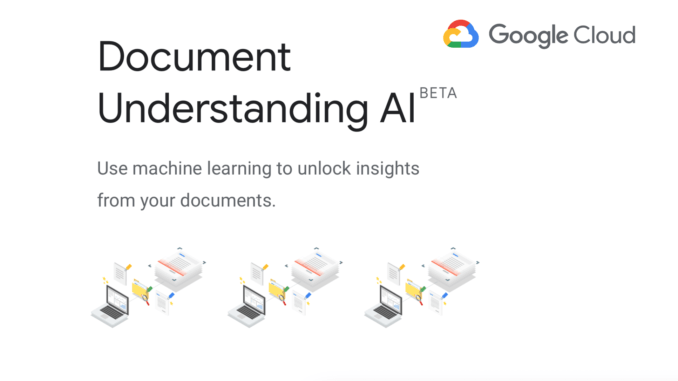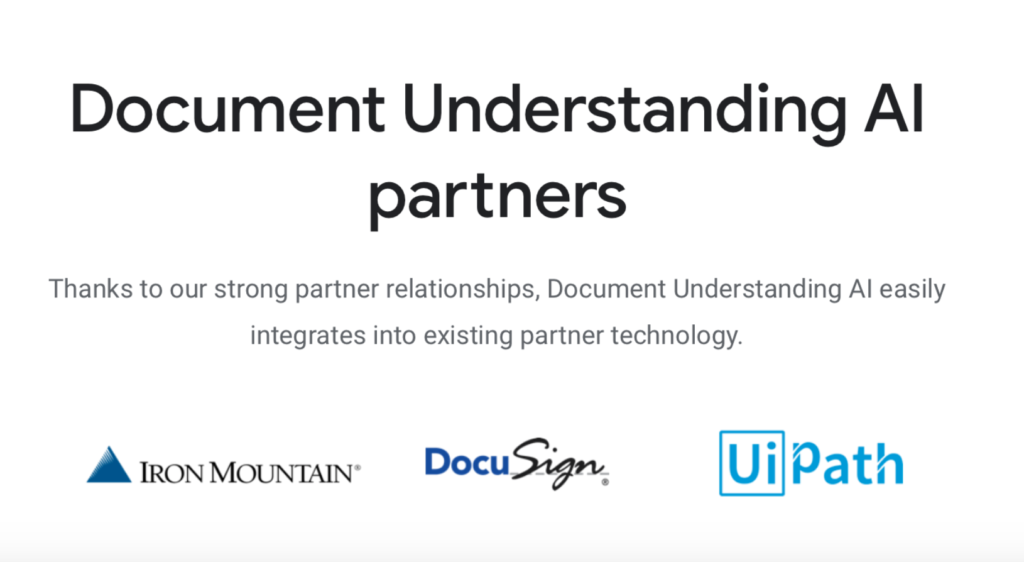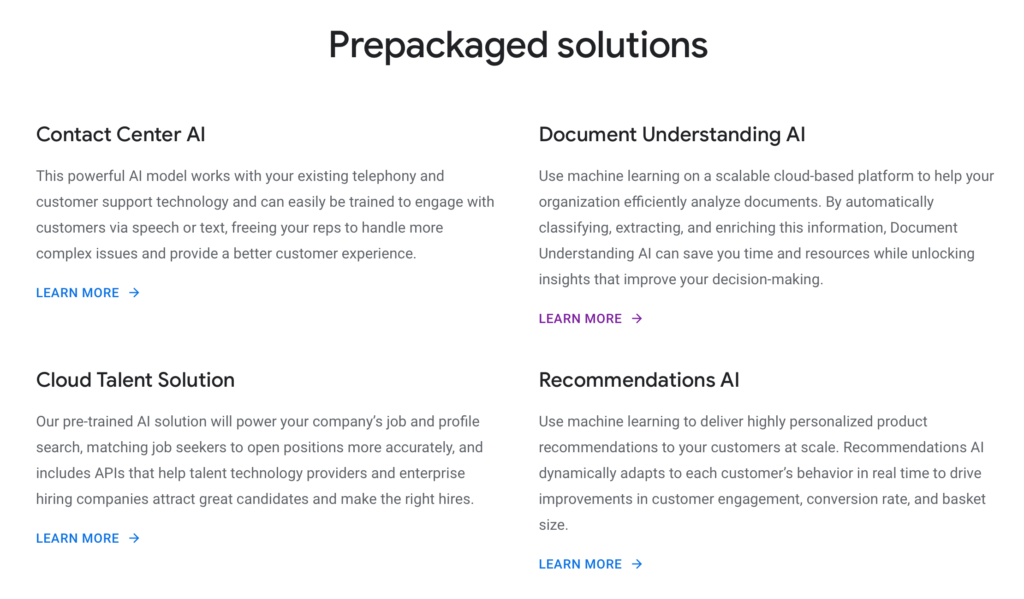
Some stories hit the headlines like a tornado, others seep into public consciousness over several weeks. The news about Google now offering extraction and analysis of unstructured data from contracts is of the latter variety. But will it make an impact, will it shake up the legal AI market?
Here’s the paragraph on the Google Cloud services page, under the heading: ‘Document Understanding AI (Beta) – Digital Transaction Management’, that looks the most relevant:
‘In domains like contracts and real estate agreements, Document Understanding AI extracts insights from thousands of stored documents in order to perform semantic question answering, clustering, and classification.’
The company goes on to say that: ‘This solution enables companies to digitize, classify, and extract knowledge — such as form fields, text passages, tables, and graphs — from thousands of documents. It helps to organise and store knowledge graphs and other extracted data for easy search, query, consumption, and actionable insights.’
And then, adds: ‘[The] solution scales document management across multiple industries — such as finance, legal, and healthcare — for custom entity extractions and representation in a knowledge graph.’
Moreover, the Document Understanding AI bit is part of four strands of related capability that Google is flogging to the world – and all you need to do is have a Google account and a credit card and it’s all yours to use and build with (see below). This is all separate from the London-based DeepMind AI brain trust that Alphabet, the Google parent company, also owns.
All in all this should be making legal AI companies quake in their boots……? Right?
Er…not so fast. We’ve been here before.
Déjà AI
First, there’s another famous tech company that has been providing the wider world with a means of crunching unstructured data – and its name is IBM, with its Watson offering. This has been around for some years and several legal tech companies have made use of it in the past, and some still base their AI doc review capabilities upon IBM Watson.
The existence of IBM Watson has not meant the end of legal AI companies, in fact the opposite – it’s helped them to build products based upon this suite of NLP and ML software.
Also, in December 2018, Artificial Lawyer covered two examples of Mega Tech companies, Microsoft and Amazon, offering doc review capabilities. See below:
‘Microsoft, is to broaden the appeal of its NLP and machine learning tools for doc review as part of a project to bring its Azure Cognitive Service capabilities into the Power BI platform for business level analysis and data visualisations. The service will open for public preview from March 2019.
Microsoft said that they are going to offer ‘powerful ways to extract information from a variety of sources like documents, images, and social media feeds…[which] can identify named entities such as organisations, people, and locations’, through the business-focused BI dashboard.
‘The algorithms can … identify key phrases, and determine positive or negative sentiment,’ the US company added.
[This] follows swiftly on the heels of a piece Artificial Lawyer wrote about how Amazon was now offering a suite of NLP capabilities for reviewing medical texts and what would happen if a Big Tech giant like this moved into the legal sector.’ [Dec 2018]
I.e. Amazon and Microsoft have already brought to market suites of software that allow those with sufficient technical ability to extract unstructured data…..and…..the world of legal AI did not fall apart.
So, there’s three companies that have already been doing this, and the legal AI sector’s many companies appear to be in great health.
Is This A Threat In The Future?
For now, it would appear that unless you have a really committed tech team in your firm or inhouse legal group, that wants to do this kind of thing, then exploring the above offering to build your own custom NLP extraction ‘recipes’ seems unlikely.
As with IBM Watson, what may happen instead is that this powerful software is taken up by startups wanting to tap it in order to build their own products, which would add to the total number of legal tech companies out there, rather than reduce them.
The key issue here is: who is going to do all the training? Who is going to bring the legal domain expertise to bear and make sure the output is accurate and appropriate and reliable?
Which suggests that, although this is a fascinating offering, most lawyers will just go to the trusted legal AI brands they know already. Or, to new brands that are providing products based on the above tech.
But…….of course, as the investment funds always say: ‘Past performance is no guarantee of future results.’
This is especially true when one sees that the Google Cloud AI kit can be integrated with not just DocuSign, but also robotic process automation (RPA) pioneer, UiPath.

What if a large company starts to see all of its contracts and other text-based unstructured data as something that needs a top down solution? I.e. not just driven by the legal team that tends to use well-known legal AI products?
What if this large company’s central tech team says to itself: ‘We have the ability to tap Google’s AI platform and build what we need – especially if we work with the partner companies and consultancies such as Accenture. What we build will be used across the enterprise, in sales, in procurement, and in legal. It will be worth the effort to build a complete solution if we take that approach.’
Now, at this point things would actually heat up. Some large companies are already rather excited about using RPA, why not use Google’s AI platform to handle unstructured data extraction and then link it all together? Why not apply this to enterprise search as well, as there’s no need to stop at review? After all, Google is partnering with Iron Mountain, which is offering among other services, a contract management platform.
It’s not impossible that things could change if a large number of top companies really decided to move in that direction.
But, what happens then to the legal AI companies? Artificial Lawyer’s guess is that the law firm market will continue to buy ‘known brand’ legal AI tech for many years to come. But, for the very large corporates that see the world beyond a legal prism (see article on this) then things could change in the years ahead.
The largest corporations do have the internal capacity and resources to build what they want with these tools, rather than buying them in. They may see such a project as covering all parts of the business, and not just something inspired by the legal team – and because of this they also may be much more effective in funding it and making sure it’s implemented across the whole business.
Luckily for the growing number of legal AI companies now focused on winning corporate clients, it’s a very big market. There are many more large companies on this planet than large commercial law firms. That means a market big enough for several players.
Conclusion
Going back to Amazon, Microsoft and IBM Watson, perhaps the surprising thing is that offering these suites of technology to the world has not led to the end of dozens of tech companies in multiple fields providing narrow and tailored AI solutions.
Google’s offering may be no different in its impact.
Much also depends on what Google wants to do with it. Looking at how they are marketing it, (N.B. Artificial Lawyer had a chat with one of Google’s sales people about what was on offer and this was very illuminating….), this is very much a ‘we just supply the bricks – you build the house’ strategy.
Google is not – yet – selling pre-made, super-researched, NLP packages for extracting specific data related to M&A due diligence exercises, or LIBOR, or Brexit. Super-narrow solutions have never really been its overall business model. It always seeks to be the ultimate generalist provider in the room, with Google’s search capability as the best example of this.
Alphabet, Google’s parent, is a $137 billion a year revenue company. If it wanted to go all in on providing tailored legal products it could and wouldn’t even notice it. But, it hasn’t…..yet.
Nevertheless, interesting times and something that will keep the legal AI sector on its toes, especially among those selling into larger companies.

Richard: thank you for this very helpful commentary and your assessment. I agree with your view:
„The key issue here is: who is going to do all the training? Who is going to bring the legal domain expertise to bear and make sure the output is accurate and appropriate and reliable?“
I would guess that Google does not have the training capabilities, would not even want to do the training, and does not have the deep legal domain knowledge as well. So, I guess all of this will be left to new companies and us lawyers, so, for the lawyers, there’s nothing to be afraid of here, it just goes to show that the digital tools to improve legal services are there and are getting better, for whoever needs them.
I also agree with your conclusions, but note that they are based on business considerations not technological possibilities. Basically, the argument goes, the legal tech market is too narrow for Google to be interested in it. That could change as the technology changes. Google’s marketing materials do not say very much, but it looks like their cloud-based document analysis is using fairly conventional text-processing technologies. The state-of-the-art is way beyond this. Here is an interesting summary from Casetext:
https://blog.casetext.com/use-of-ai-at-casetext-7bda0c31d0e7
Notice how much of the leading research is coming from Google.